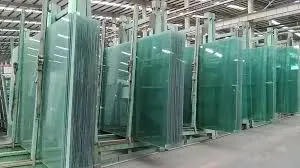Understanding Glazing Tempered Glass Properties, Applications, and Benefits
Tempered glass, often referred to as toughened glass, has become a critical material in modern architecture and design. Its distinctive properties make it ideal for a variety of glazing applications, where strength, safety, and aesthetic appeal are paramount. This article explores the characteristics, production process, applications, and advantages of glazing tempered glass to highlight why it is favored in both residential and commercial settings.
What is Tempered Glass?
Tempered glass is produced through a special process of extreme heating and rapid cooling. This technique increases the glass's strength and durability compared to normal glass. When ordinary glass breaks, it shatters into sharp shards that can cause injuries; however, tempered glass breaks into small, blunt pieces. This safety feature is one of the primary reasons tempered glass is commonly used in places where safety is a concern.
Production Process
The production of tempered glass involves several steps. First, the glass is cut to the desired size and shape. Next, it undergoes a heating process in a tempering furnace, where it is heated to temperatures between 600 and 700 degrees Celsius. This extreme heat is followed by rapid cooling using high-velocity air, a process known as quenching. This combination of heating and cooling strengthens the glass, allowing it to withstand higher levels of stress and pressure.
Properties of Tempered Glass
1. Strength Tempered glass is several times stronger than regular glass, making it suitable for applications requiring high strength.
2. Thermal Resistance It can withstand temperature changes better than other types of glass. For instance, it can be used in situations where sudden temperature variations may occur, such as in shower doors or skylights.
3. Safety As mentioned, when broken, it shatters into small, less dangerous pieces, significantly reducing the risk of injury.
4. Aesthetic Appeal Available in various thicknesses and finishes, tempered glass can enhance the visual appeal of structures, making it a popular choice among architects and designers.
Applications of Tempered Glass
The versatility of tempered glass allows for its use across multiple applications
glazing tempered glass
1. Commercial Building Facades Tempered glass is commonly used in the facades of commercial buildings, where both aesthetics and durability are critical.
2. Shower Doors and Partitions Due to its ability to resist changing temperatures and breakage, tempered glass is the go-to choice for shower enclosures.
3. Glass Railings In both residential and commercial settings, tempered glass railings provide safety without obstructing the view, maintaining an open and airy feel.
4. Automotive Industry Many car windows and windshields are made from tempered glass, offering both safety and strength.
5. Furniture Many modern furniture designs incorporate tempered glass, such as tabletops and shelving, combining elegance with robust construction.
Benefits of Using Tempered Glass
Choosing tempered glass over other types of glass comes with several benefits
1. Increased Safety It greatly reduces the risk of injury compared to traditional glass.
2. Longevity Tempered glass has a longer lifespan due to its resistance to impact and thermal stress.
3. Lightweight Despite its strength, tempered glass is relatively lightweight, making it easier to handle and install.
4. Versatile Design Options The array of finishes and thickness options allows for extensive design possibilities in both commercial and residential projects.
In conclusion, glazing tempered glass is a vital and versatile material that has become increasingly prevalent in various applications. Its combination of strength, safety features, and aesthetic qualities makes it an ideal choice for architects, designers, and manufacturers. As demand grows for safer and more sustainable building materials, tempered glass is likely to remain a cornerstone of modern construction and design.
 Afrikaans
Afrikaans  Albanian
Albanian  Amharic
Amharic  Arabic
Arabic  Armenian
Armenian  Azerbaijani
Azerbaijani  Basque
Basque  Belarusian
Belarusian  Bengali
Bengali  Bosnian
Bosnian  Bulgarian
Bulgarian  Catalan
Catalan  Cebuano
Cebuano  Corsican
Corsican  Croatian
Croatian  Czech
Czech  Danish
Danish  Dutch
Dutch  English
English  Esperanto
Esperanto  Estonian
Estonian  Finnish
Finnish  French
French  Frisian
Frisian  Galician
Galician  Georgian
Georgian  German
German  Greek
Greek  Gujarati
Gujarati  Haitian Creole
Haitian Creole  hausa
hausa  hawaiian
hawaiian  Hebrew
Hebrew  Hindi
Hindi  Miao
Miao  Hungarian
Hungarian  Icelandic
Icelandic  igbo
igbo  Indonesian
Indonesian  irish
irish  Italian
Italian  Japanese
Japanese  Javanese
Javanese  Kannada
Kannada  kazakh
kazakh  Khmer
Khmer  Rwandese
Rwandese  Korean
Korean  Kurdish
Kurdish  Kyrgyz
Kyrgyz  Lao
Lao  Latin
Latin  Latvian
Latvian  Lithuanian
Lithuanian  Luxembourgish
Luxembourgish  Macedonian
Macedonian  Malgashi
Malgashi  Malay
Malay  Malayalam
Malayalam  Maltese
Maltese  Maori
Maori  Marathi
Marathi  Mongolian
Mongolian  Myanmar
Myanmar  Nepali
Nepali  Norwegian
Norwegian  Norwegian
Norwegian  Occitan
Occitan  Pashto
Pashto  Persian
Persian  Polish
Polish  Portuguese
Portuguese  Punjabi
Punjabi  Romanian
Romanian  Russian
Russian  Samoan
Samoan  Scottish Gaelic
Scottish Gaelic  Serbian
Serbian  Sesotho
Sesotho  Shona
Shona  Sindhi
Sindhi  Sinhala
Sinhala  Slovak
Slovak  Slovenian
Slovenian  Somali
Somali  Spanish
Spanish  Sundanese
Sundanese  Swahili
Swahili  Swedish
Swedish  Tagalog
Tagalog  Tajik
Tajik  Tamil
Tamil  Tatar
Tatar  Telugu
Telugu  Thai
Thai  Turkish
Turkish  Turkmen
Turkmen  Ukrainian
Ukrainian  Urdu
Urdu  Uighur
Uighur  Uzbek
Uzbek  Vietnamese
Vietnamese  Welsh
Welsh  Bantu
Bantu  Yiddish
Yiddish  Yoruba
Yoruba  Zulu
Zulu 

